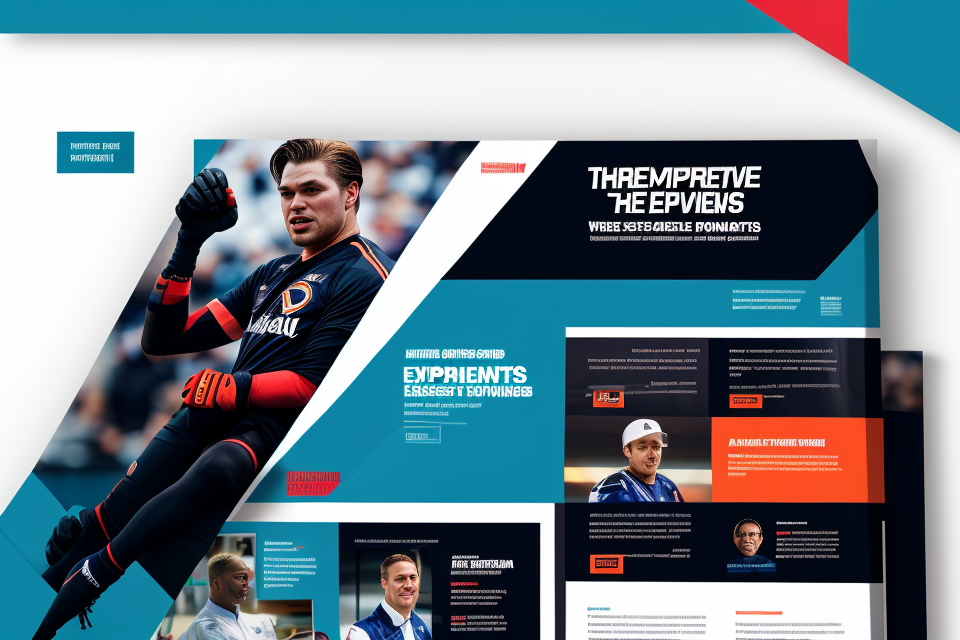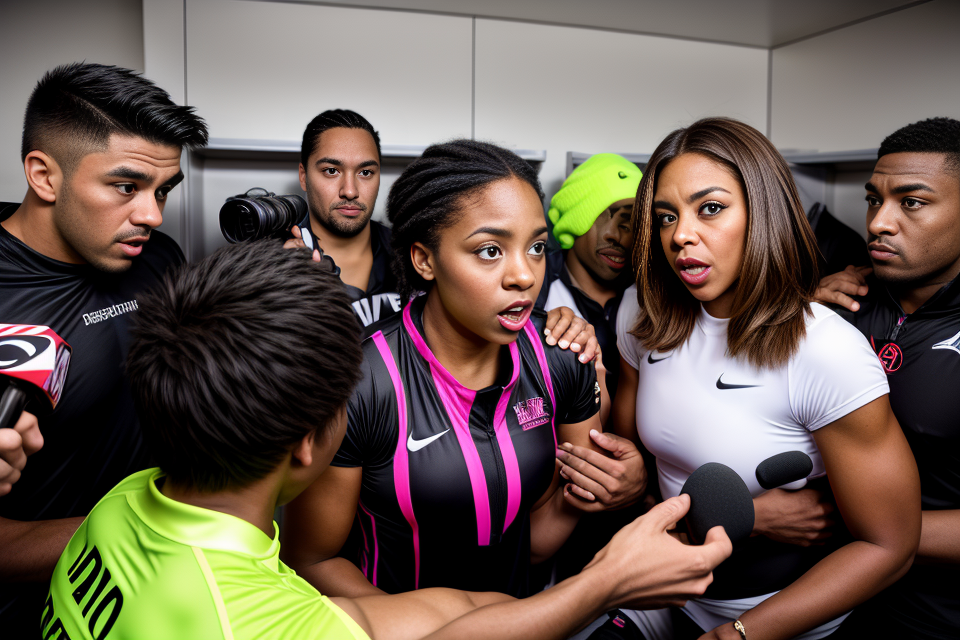Interviewing a sports coach is a crucial task when looking for the right person to lead your team to victory. But how do you conduct a successful sports coach interview? This article will provide you with some tips and tricks to help you get the most out of your interview process. From preparing questions to assessing the coach’s personality and coaching style, we’ll cover it all. So, let’s dive in and discover how to make your sports coach interview a success.
Preparing for the Interview
Setting the Interview Goals
When conducting a sports coach interview, it is crucial to set clear goals for the conversation. This will help ensure that the interview is productive and focused, and that the necessary information is gathered. Here are some steps to follow when setting the interview goals:
Define the purpose of the interview
The first step in setting the interview goals is to define the purpose of the interview. What do you hope to achieve by conducting this interview? Is it to assess the coach’s qualifications, to understand their coaching philosophy, or to get a sense of their communication style? Defining the purpose of the interview will help you determine the key questions to ask and the topics to cover.
Determine the key questions to ask
Once you have defined the purpose of the interview, you can begin to determine the key questions to ask. These should be open-ended questions that allow the coach to provide detailed responses and give you a better understanding of their coaching style and philosophy. Some examples of key questions to ask might include:
- Can you tell me about your coaching background and experience?
- How do you develop a training program for your athletes?
- How do you motivate and support your athletes?
- Can you describe a challenging situation you faced as a coach and how you overcame it?
Identify the key topics to cover
In addition to determining the key questions to ask, you should also identify the key topics to cover during the interview. These might include the coach’s coaching philosophy, communication style, training methods, and experience working with athletes at various levels. By identifying the key topics to cover, you can ensure that you cover all the necessary ground during the interview and that you gather all the information you need to make an informed decision.
Overall, setting the interview goals is a critical step in conducting a successful sports coach interview. By defining the purpose of the interview, determining the key questions to ask, and identifying the key topics to cover, you can ensure that the interview is productive and focused, and that you gather all the necessary information to make an informed decision.
Researching the Coach
- Review the coach’s background and experience
When conducting research on a sports coach, it is important to review their background and experience. This includes looking at their education, previous coaching positions, and any relevant achievements or awards. It is also helpful to review the coach’s playing experience, as this can provide insight into their knowledge and understanding of the sport.
- Study the team’s performance and playing style
Another key aspect of researching a sports coach is to study the team’s performance and playing style. This can provide insight into the coach’s coaching philosophy and the approach they take to the sport. By analyzing the team’s performance, you can also identify areas where the coach may excel or struggle, which can help guide the direction of the interview.
- Familiarize yourself with the coach’s coaching philosophy
It is also important to familiarize yourself with the coach’s coaching philosophy. This includes understanding their approach to training, player development, and game strategy. By understanding the coach’s philosophy, you can ask targeted questions during the interview that will help you gain a deeper understanding of their coaching style and approach. Additionally, familiarizing yourself with the coach’s philosophy can help you assess whether they are a good fit for the team and the players.
Choosing the Interview Format
When it comes to conducting a successful sports coach interview, one of the first steps is to choose the appropriate interview format. There are three main options to consider: in-person, over the phone, or via video conference.
In-Person Interviews
In-person interviews can be a great way to get a sense of the coach’s personality and demeanor. You can observe their body language, ask follow-up questions, and generally get a better feel for their communication style. However, in-person interviews can be time-consuming and may not be feasible if the coach is located far away.
Phone Interviews
Phone interviews are a convenient option when the coach is located far away or if you have a limited budget for travel. They can be just as effective as in-person interviews, as long as you are diligent about taking notes and asking clear, concise questions. One downside of phone interviews is that you won’t be able to observe the coach’s body language or nonverbal cues.
Video Conferences
Video conferences are a great option for coaches who are located far away or for those who prefer the convenience of remote communication. They offer a more personal touch than phone interviews and allow you to observe the coach’s body language and nonverbal cues. However, you may need to invest in special equipment, such as a webcam or microphone, to ensure clear communication.
When choosing the interview format, it’s important to consider your goals for the interview and the coach’s availability. If you are looking to get a sense of the coach’s personality and communication style, an in-person interview may be the best option. If the coach is located far away, a phone or video conference may be more practical. Ultimately, the format you choose should be the one that best suits your needs and allows you to ask clear, concise questions.
Conducting the Interview
Building Rapport
- Begin the interview with small talk:
- Start the interview by introducing yourself and your role in the interview process.
- Ask the coach about their background and experience in coaching the specific sport.
- Inquire about their current coaching philosophy and how it has evolved over time.
- Discuss their thoughts on the upcoming season and any expectations they have for their team.
- Show genuine interest in the coach and their team:
- Ask open-ended questions to encourage the coach to share their thoughts and feelings about their team and the sport.
- Listen actively and respond with appropriate feedback or questions to show that you are engaged in the conversation.
- Show empathy and understanding when the coach shares challenges or setbacks they have faced.
- Establish a comfortable and respectful atmosphere:
- Ensure that the interview takes place in a quiet and private location, free from distractions.
- Be mindful of the coach’s time and ensure that the interview stays within the allocated time frame.
- Treat the coach with respect and professionalism, and avoid asking inappropriate or sensitive questions.
- End the interview by thanking the coach for their time and providing a summary of the key points discussed during the interview.
Asking Open-Ended Questions
When conducting a sports coach interview, it is important to ask open-ended questions to encourage the coach to share their thoughts and experiences. Here are some tips for asking open-ended questions:
- Avoid yes or no questions: Yes or no questions can lead to short and unsatisfying answers. Instead, ask questions that require more than a simple yes or no response.
- Use open-ended questions: Open-ended questions allow the coach to provide more detailed and informative answers. For example, instead of asking “Do you have a coaching philosophy?”, ask “Can you describe your coaching philosophy?”
- Be specific: To get the most useful information, be specific when asking questions. For example, instead of asking “How do you motivate your players?”, ask “What specific techniques do you use to motivate your players?”
Here are some examples of open-ended questions that can be used during a sports coach interview:
- Can you describe your coaching philosophy?
- How do you motivate your players?
- What is your approach to team building?
- How do you handle conflicts within the team?
- Can you give an example of a successful team-building exercise you have conducted?
By asking open-ended questions, you can gain a better understanding of the coach’s approach to coaching and how they would be able to handle various situations that may arise during their tenure.
Active Listening
When conducting a sports coach interview, active listening is crucial to gain valuable insights from the coach. Here are some tips to help you practice active listening during the interview:
- Pay attention to the coach’s responses: Make sure to give the coach your full attention. Avoid interrupting or becoming distracted by other things. Maintain eye contact and show that you are interested in what the coach has to say.
- Take notes and ask follow-up questions: Taking notes during the interview can help you remember important details and insights later on. Write down key points, observations, and any questions that come to mind. After the interview, review your notes and use them to formulate follow-up questions to ask the coach.
- Show that you are engaged and interested in what the coach has to say: Demonstrate your interest in the coach’s perspective by asking thoughtful questions and providing feedback. Use nonverbal cues such as nodding and making eye contact to show that you are engaged in the conversation. By actively listening to the coach, you can gain a better understanding of their coaching philosophy, approach, and methods, which can help you make informed decisions when evaluating their candidacy for the coaching position.
Managing the Time
- Stick to the allotted time for the interview: It is essential to allocate a specific amount of time for the interview to ensure that the conversation stays focused and on track. The interviewer should keep an eye on the time and be mindful of not going over the allotted time.
- Prioritize the most important questions: It is crucial to prepare a list of questions before the interview and prioritize the most important ones. The interviewer should focus on asking these critical questions first and avoid getting sidetracked by less significant topics.
- If time runs out, schedule a follow-up interview to cover any remaining topics: If the interviewer feels that there are still important questions that need to be asked, they should consider scheduling a follow-up interview to cover these topics in more detail. This approach ensures that all critical questions are answered and provides the coach with the opportunity to elaborate on their ideas and experiences.
By managing the time effectively, the interviewer can ensure that the interview stays focused and productive, and the coach has the opportunity to share their insights and experiences in a structured and organized manner.
Closing the Interview
When closing the interview, it is important to express gratitude towards the coach for their time and valuable insights. This demonstrates respect and appreciation for their input. Furthermore, reiterating the key takeaways from the interview allows for a summary of the most important information discussed. This can be beneficial for both the interviewer and the coach, as it helps to ensure that the key points are not forgotten or overlooked.
It is also important to end the interview on a positive note. This can be achieved by thanking the coach once again for their time and expressing enthusiasm for future interactions. This demonstrates a positive attitude and encourages further communication. Additionally, it is a good idea to provide a follow-up plan, outlining any next steps or further actions that will be taken as a result of the interview. This helps to maintain a sense of professionalism and organization.
After the Interview
Reviewing the Interview
Importance of Reviewing the Interview
Conducting a successful sports coach interview is not only about asking the right questions during the interview but also about reviewing the interview after it has been conducted. Reviewing the interview allows you to identify areas where you could have asked better questions or listened more closely, which can be valuable information for future interviews. It also helps you reflect on what you learned from the interview and how you can use that information to improve your coaching methods.
Reviewing Your Notes and Recordings
The first step in reviewing the interview is to go through your notes and recordings. Take note of any important points that were discussed during the interview, as well as any questions that were asked or answers that were provided. Reviewing your notes can help you identify areas where you may have missed important information or where you could have asked follow-up questions.
Identifying Areas for Improvement
Once you have reviewed your notes and recordings, take some time to identify areas where you could have asked better questions or listened more closely. For example, did you miss any important details or fail to follow up on a question that was asked? Did you ask leading questions or interrupt the coach during their responses? Identifying these areas can help you improve your interviewing skills for future interviews.
Reflecting on What You Learned
Finally, take some time to reflect on what you learned from the interview. Consider how the coach’s answers aligned with your expectations, and whether you learned anything new or unexpected. Reflecting on what you learned can help you identify areas where you may need to do further research or seek additional feedback from other coaches or experts in the field.
Writing the Article
Organize your notes and findings
- Gather all your notes and findings from the sports coach interview.
- Organize them in a logical order that makes sense for the article.
- Consider grouping similar information together and creating subheadings to help structure the article.
Write a draft of the article
- Start with an introduction that provides context for the interview and sets the stage for the article.
- Use the subheadings you created to organize the information into sections.
- Include quotes from the sports coach interview to support your findings and add credibility to the article.
- Make sure to include any relevant statistics or data that support the main points of the article.
- End with a conclusion that summarizes the main findings and provides recommendations for readers.
Revise and edit the article for clarity and coherence
- Read through the article and look for areas that need improvement.
- Check for grammar and spelling errors.
- Make sure the article flows well and is easy to read.
- Consider the audience and adjust the language and tone as necessary.
- Ask a colleague or friend to review the article and provide feedback.
- Use their feedback to make any necessary revisions and improvements to the article.
Sharing the Article
After conducting a successful sports coach interview, it’s important to share the article with your audience. Here are some steps to follow:
Publish the article on your blog or website
Once you have completed the interview and written the article, it’s time to publish it on your blog or website. Choose a catchy title that accurately reflects the content of the article and include relevant images or graphics to break up the text and make it more visually appealing. Be sure to proofread the article thoroughly to ensure that it is free of errors and easy to read.
Share the article on social media and other relevant platforms
Once the article is published, it’s time to share it with your audience. Use social media platforms like Twitter, Facebook, and LinkedIn to promote the article and reach a wider audience. You can also share the article on relevant forums or online communities where sports coaches and enthusiasts gather.
Engage with your readers and respond to any comments or questions
When you share the article on social media or other platforms, be sure to engage with your readers. Respond to any comments or questions that are posted and take the time to thank readers for their feedback. This will help to build a community around your content and encourage readers to come back for more.
By following these steps, you can ensure that your sports coach interview article reaches a wide audience and engages readers in a meaningful way.
FAQs
1. What are the key qualities to look for in a sports coach?
When interviewing a sports coach, it’s important to assess their qualities that make them effective in their role. Look for coaches who are passionate about their sport, have a strong knowledge of the game, and can demonstrate a proven track record of success. They should also have excellent communication skills, be able to motivate and inspire their players, and have a clear coaching philosophy. Additionally, consider the coach’s ability to adapt their coaching style to different players and situations, as well as their commitment to ongoing professional development.
2. What questions should I ask during the interview?
During the interview, it’s important to ask questions that will help you assess the coach’s qualifications, coaching style, and philosophy. Some key questions to ask include:
* What is your coaching background and experience?
* How do you develop and implement training programs?
* How do you motivate and inspire your players?
* How do you handle conflicts or difficult situations within the team?
* What is your coaching philosophy, and how do you instill it in your players?
* How do you communicate with parents and other stakeholders?
* What is your approach to injury prevention and management?
* How do you balance winning with player development?
* What is your long-term vision for the team?
3. How can I assess the coach’s communication skills?
Communication is a critical aspect of coaching, so it’s important to assess the coach’s communication skills during the interview. Look for coaches who are able to explain complex concepts in a clear and concise manner, listen actively to their players, and respond thoughtfully to questions. You can also ask the coach to provide examples of how they have communicated with players and parents in the past, and how they would handle challenging situations.
4. What is the best way to evaluate the coach’s coaching style?
To evaluate the coach’s coaching style, you should observe them during a practice or game, if possible. This will give you a sense of their coaching style, as well as their ability to interact with players and manage the team. You can also ask the coach to describe their coaching style and how it has evolved over time. Additionally, consider the coach’s approach to player development, as well as their ability to adapt their coaching style to different players and situations.
5. How important is the coach’s coaching philosophy?
The coach’s coaching philosophy is an important factor to consider when hiring a sports coach. It should align with your organization’s values and goals, as well as the needs and interests of the players. Look for coaches who prioritize player development, enjoyment, and healthy competition, and who foster a positive and supportive team culture. Additionally, consider the coach’s approach to injury prevention and management, as well as their commitment to ongoing professional development.
6. How can I assess the coach’s experience and qualifications?
To assess the coach’s experience and qualifications, review their resume and ask for references from previous employers or players. Look for coaches who have a strong track record of success, as well as relevant certifications and training. Additionally, consider the coach’s ability to adapt their coaching style to different players and situations, as well as their commitment to ongoing professional development.










